The post Keeping Hope Alive During a Genocide appeared first on Islamic Horizons.
]]>By Sundus Abrar
July/Aug 2024
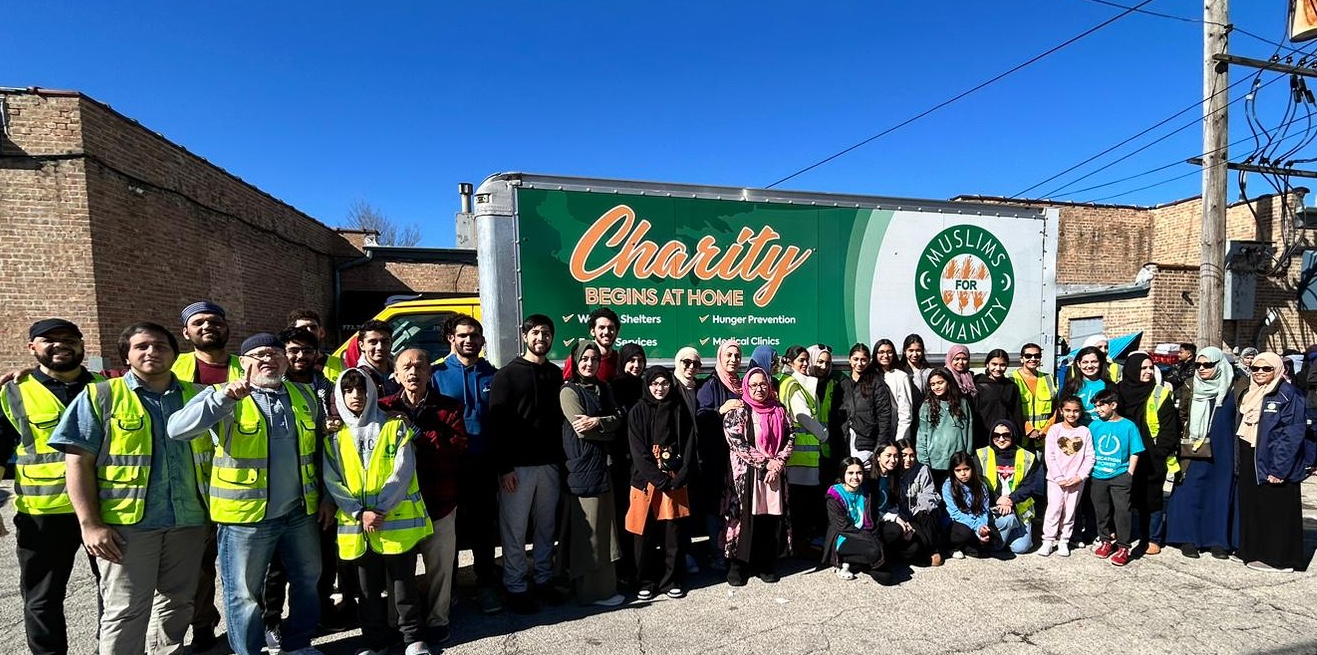
Muslim nonprofits primarily depend on the generosity of donors. Ramadan is the peak season for fundraising because of the promised reward of good deeds being multiplied. This drives many to prefer fulfilling the obligation of zakat during Ramadan, even though it can be given at any time.
Zakat is broadly calculated as 2.5% of savings and investments. In the same vein, Muslims also give more voluntary charity (sadaqah) in Ramadan. This remarkable generosity in Ramadan is not consistent after it and nor is it indicative of long-term trends. This sporadic shift in monetary contributions is further amplified when Muslims redirect their contributions primarily towards supporting people struggling across the globe. The genocide in Gaza has correlated with diminished funds going towards local relief programs. “Of course Muslims should continue to give to international causes which are so important, but a portion has to be shared here,” said Saima Azfar, Regional Director of ICNA Relief Midwest.
“People give a lot during Ramadan, and then there is very little for some time after,” said Nawal Ali (fund development coordinator, ISNA). “Global crises do take attention away from local efforts. The potential of community events to benefit the ummah may feel like a secondary concern when people are grappling with the basics and lack of security.”
She believes Muslim communities often feel compelled to direct more money toward providing relief for dire shortages of food, shelter and health during man-made crises or natural disasters, which do evoke a stronger response. However, efforts to benefit local communities must be given due attention too. “You need to build a community for it to thrive,” said Ali.
Community events can build confidence in individual members, encourage more involvement and collaboration from individuals. Through this, communities can be more aligned and allow them to be more effective in serving locally and globally. Maintaining a steady focus on community support services can be achieved through consistent communication and monetary support. She encourages all organizations to focus on feedback and responding to criticism.
Remember Your Neighbors
Many organizations grapple with shifts in charitable contributions when Muslims direct their contributions primarily toward global efforts.“The need is still here. One in 5 children are hungry in our own neighborhoods. We cannot stop here. We must continue to serve our neighbors too,” Azfar said.
ICNA Relief’s efforts seek to provide Muslims with, among other help, food, housing and health services. Some programs may qualify for federal grants, but the organization primarily depends on fundraising. Despite the proximity of the many programs addressing local Muslims’ needs, donors sometimes lose perspective of them when responding to issues affecting the ummah.
Abdullah Syed (development coordinator, A Continuous Charity [ACC]), agrees. ACC entrusts Muslim students with interest-free loans, thereby emphasizing the importance of relevant outreach. “I do believe that whenever there is a disaster, whether natural or man-made, people end up giving more. However, it’s not a finite pool. We saw that in Covid, people had increased their giving to ACC,” he remarked.
At the onset of the genocide in Gaza, ACC cancelled fundraising events in October through December in response to the sheer devastation Still, reframing and recommitting to local efforts has potential to benefit Muslims world over. “The best thing to do is to continue our mission and look towards long term goals. For us, educating our community allows us to have a louder voice. If we can educate our community we are able to create future leaders who can be changemakers in all fields possible,” Syed said.
Diversified Fundraising
Muslims Understanding and Helping Special Education Needs (MUHSEN) also relies on the generosity of donors. However, they understand the critical need in Gaza and other parts of the world.
“One thing we always remind donors and those fundraising for us is that there is room for both; one can support a humanitarian cause as well as our mission,” said Kiran Ahmad, MUHSEN Development Coordinator. “Our goal as a nonprofit is to fill the gaps of service that other organizations have not been able to. Grants, crowdfunding, donation matching, and fundraising during different times in the year have kept us growing.” Nonprofits should work to be mindful in how they advertise with funds. “We try to spread our mission through primarily showcasing our work as it speaks for itself,” Ahmad added. In her experience, private donor dinners tend to have better outcomes for fundraising as special needs families are not always able to partake in the Ramadan social events.
A gap in communication and awareness certainly contributes to inconsistency in donations. In Azfar’s experience with ICNA Relief’s efforts, communities respond better to requests when they are informed of the ongoing needs close to them. “As a community, we are behind on planning, and we must strategize. We are very reactive,” said Azfar.
Planning and reflection are crucial for nonprofits to sustain and grow their programs to consistently meet the needs and demands of community members. “What I have noticed is people like to donate to people. They may respond better to a specific ask,” said Syed. An intentional approach in recognizing the motivations of donors can relay into effective communication. “Diversify. People respond to different asks at different times,” said Syed. When donors are updated, and receive gratitude for their contributions it translates to a sustained relationship between a non profit organization and its contributors.
Operational Costs are Necessary
This meticulous approach requires some funding to be allocated towards operational costs. Operational costs are crucial to sustaining and growing organizations’ efforts. For instance, necessary systems to study an organization’s status and staff to consistently drive efforts could be some of the operational costs necessary for long term success and implementation of programs. Yet, donors are often weary of operational costs. The sentiment is that the donation is not going to aid the beneficiaries of the program. “That’s one of the biggest problems in the Muslim community- not understanding that you do need that operational dollar. We have to run the organization- it’s like a car. Just by simply having a car you are not going to get anywhere. You have to have gas to go from point A to point B. The money any organization needs to operate is the gas, “said Syed.
Fundraising is a constant effort, and the results are not guaranteed. A nonprofit must diversify its means of generating revenue to ensure that it can sustain and consistently extend its services. Operational costs enable the staff to implement the appropriate tools to plan and implement long term programs.
Directing funds to endowments and investing is a promising approach to overcoming the inconsistencies in fundraising patterns. Endowments can cover ongoing long-term operational costs thus minimizing this ask which causes much hesitation. While conveying the immediate benefit of this approach is challenging to convey, it is imperative to support nonprofits as they strive towards sustainability and educate our communities of the potential return on the various halal investment opportunities such as Islamic mutual funds, real estate, start-ups and more.
“This is a vital need. You can’t serve and continue with an organization on a day-to-day basis. We have endowment funds. We are encouraging donors to give on a recurring basis, seeking grants from foundations, and seeking government funding,” Azfar emphasized. Grants do offer some reprieve, but often come with guidelines that can restrict an organization’s capacity to serve. “We want to provide our families with extra support and help them holistically. Sometimes grants don’t take this into consideration. Endowment must take precedence for the longevity of support efforts.”
The Muslim community should be aware of financial trends and take them into observed consideration when approaching sustainability in nonprofits. A historical and unprecedented transfer of wealth is anticipated. “The Great Wealth Transfer” is expected to take place over approximately the next two decades where approximately $70 to $90 trillion will be inherited from baby boomers. “This is a huge area of opportunity that may not come again. Muslims can really benefit, and this can be utilized for creating meaningful change, “ said Syed. One way for the Muslim community to maximize this opportunity is to consider listing Non-profit organizations as beneficiaries in wills. “Planned giving is often overlooked in the Muslim community, and something that should be looked into,“ said Syed.
While Muslims need to be informed and responsive to the struggles of the global ummah, we must not lose sight of our ability to create long-term change. “We need to step up, put our brains together and join hands to think how we can protect future generations,” Azfar contended. “We need to craft a thoughtful approach to see the sustainability of nonprofits and amplify the potential of the Muslim community to advance in all areas.”
Sundus Abrar is a resident of Chicago, parent of two, and an elected representative in the Local School Council. Additional reporting by Yusra Shakaib.
Tell us what you thought by joining our Facebook community. You can also send comments and story pitches to [email protected]. Islamic Horizons does not publish unsolicited material.
The post Keeping Hope Alive During a Genocide appeared first on Islamic Horizons.
]]>The post Aging Muslims in North America appeared first on Islamic Horizons.
]]>By Heather Lee
July/Aug 2024
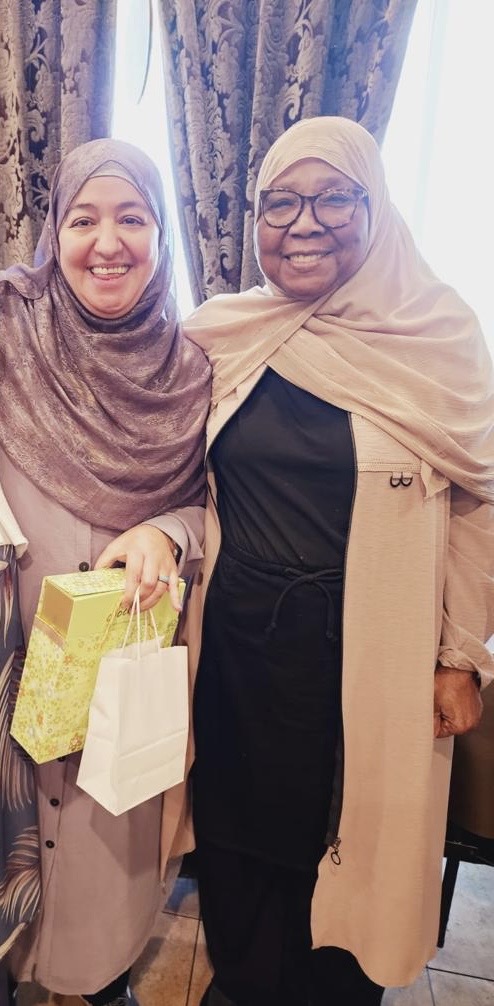
In Islam, adult children and family members are considered responsible for providing support and caring for their aging loved ones, especially parents. For some families, this may be financially or otherwise difficult to sustain. Perhaps the Muslim senior has no children, and for many others, support may be physically impossible due to living far away. What then becomes of the aging Muslim population, and how are North America’s Muslim communities ensuring inclusive programs, systems of support for them and caretakers, as well as planning post-retirement activities?
The community must care for the elderly not just because they need extra help, but because many of them have made immense sacrifices in building our community here. From the first halal meat shops, mosques and weekend schools, they have poured sweat, tears, money and time into the amenities we enjoy today. Many also have invaluable experience and wisdom to share. Muslims must remember, “Your Lord has decreed that you worship none but Him, and that you be kind to parents. Whether one or both of them attain old age in your life, say not to them a word of contempt, nor repel them, but address them in terms of honor” (17:23).
How Old is the Muslim Population?
Various factors make it a little tricky to answer this question. The defining age of becoming a senior can vary, depending on what you’re looking for, but it’s often considered to be 65, when one qualifies for Medicare. According to the 2017 Pew Research report, out of the 3.45 million self-identifying Muslims living in the U.S, 59% are between 18-39 and 12% are 55+ years old. It is estimated that by 2040, Muslims will be this country’s second largest religious group and will reach 8.1 million by 2050. This means that by 2050, Muslims within that age bracket currently 29 years of age and older will have reached the age of qualifying as senior in society.
In Canada, Muslims are the fastest growing minority group. According to research by Adelfettah Elkchirid and Jahan Zeb (“Muslim seniors face aging challenges,” The Hamilton Spectator, March 11, 2020) Muslims represent 3.2% of Canada’s total population. Further research shows that the Muslim seniors are 5.6% of that total. This raises the question: Are Muslim communities meeting the needs of their seniors?
Muslim Senior Day Centers: A Vision
Establishing Muslim senior day centers could provide a framework for seniors to engage in daily social interactions, activities and classes, as well as provide fitness opportunities. Some organizations and initiatives already exist but aren’t necessarily available for daily engagements and support for Muslim seniors and their families.
Emmanuelle M., a certified psychotherapist and spiritual care provider in Toronto, told Islamic Horizons, “Specifically in Toronto there is a need for an adult senior center for Muslims. I see individual and nonprofit organizations trying to support with what they can, but there’s no proper facility. I don’t even see people talking about this topic and educating the community.”
Senior day centers do exist both in the U.S. and Canada, but they are not Muslim-friendly. For example, most likely they don’t observe dietary restrictions or social boundaries between men and women. There may be language barriers for some seniors, and these facilities may also not be a very conducive place to offer salah on time.
“We need a space that perhaps has separate programs or timings for the senior women and men,” said Janan Webb, founder of “The Happy Seniors” in Houston. She founded this organization after recognizing the increasing and urgent need for supporting the community’s many seniors and their families.
Maintaining Independence
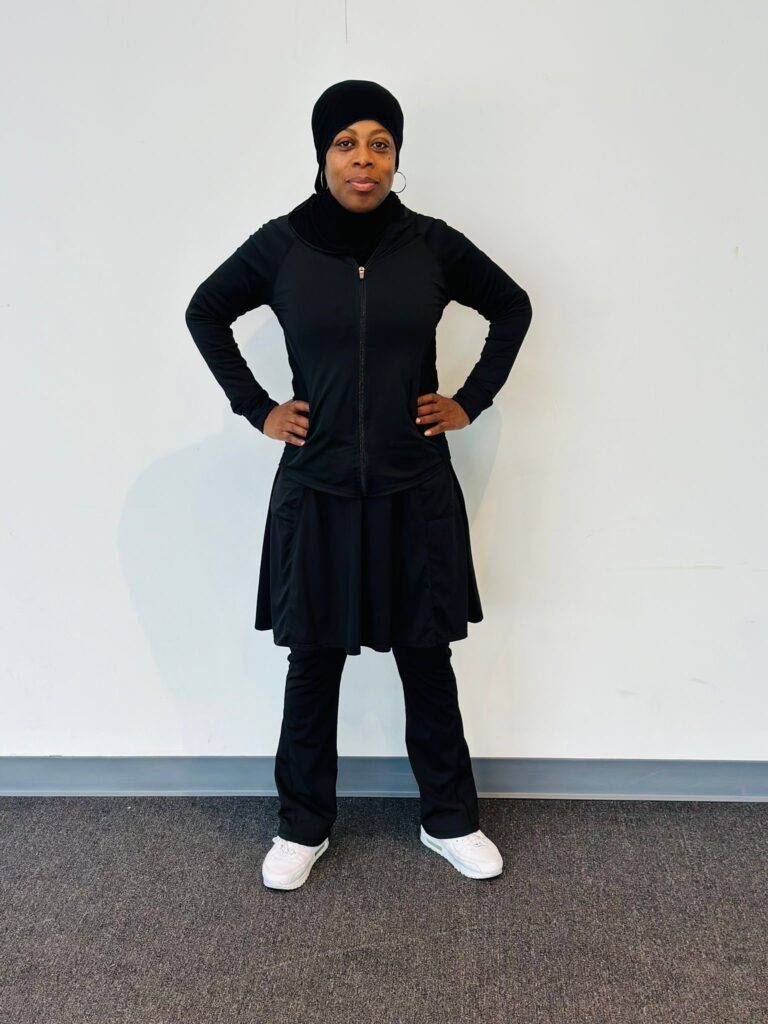
While everyone should try to stay physically fit, maintaining a fitness routine that challenges the body and builds muscle strength can help seniors live healthy and physically active lives. A term fo this viewpoint was coined in the 1950s popularized by Dr. John Row and Robert Kahn, Ph.D. known as successful aging (“Successful Aging,” Dell, 1999). Daily activities that nurture decision-making skills, independence through fitness routines and social interactions are necessary for successful aging.
Muslim senior centers could provide working out as part of the facility amenities. Gender-separate and private exercise rooms and classes might reduce hesitation for seniors to join. When they see others doing simple workouts in ethnic attire or more modest workout wear, it can be less intimidating than a traditional gym environment.
Founder of the Houston-based women’s gym, ADF Stayfit, Tahira Osama shared her experience working with Muslim seniors saying, “It’s so important for seniors to work out to maintain their ability to move and socialize. In my experience working with Muslim seniors, they build confidence when they learn that they can do modified workouts, and this allows them to keep trying.”
Caregivers Benefit Too
Aging Muslim seniors’ caregivers shared their challenges as well and the relief they feel a Muslim senior day center could bring not just for them, but also for Muslims seniors as well. “My mother has lived with me for a few years since my father died. I feel bad leaving her home alone all week while my husband and I work, and our children attend school. If she had a place to socialize with friends that I would trust to honor her Islamic values, I think this would be a huge benefit for her.”
“Isolation can be one of the worst situations that seniors in the community are facing,” said Faten Abdallah (coordinator, The Happy Seniors). She organizes meal distribution for homebound seniors who can sometimes experience isolation for multiple days. “Dealing with contacting seniors to drop off food, sometimes, breaks my heart. When I ask them how they are doing and if I can drop off food, they often say, ‘Sister I have food, but I’m alone.’ We are trying as a community, but we could do more.”
Webb wishes they could build a Muslim senior center based on an existing model developed in Australia. “A friend of mine went to Australia and brought photos of Muslim seniors.” Webb said. “They have everything they need, because it is paid for through government programs. It’s coming along where they have daily activities and weekly trips. This is what I hope we could end up doing and have a place for that to happen.”
ISNA Canada Steps Up
Some communities have recognized and built programs addressing Muslim seniors’ needs. ISNA Canada organizes monthly socials with a brunch and a variety of speakers, such as educational professionals, physiotherapists and courses on technology teaching safety online. Their other programs have included field trips to the Planetarium and Niagara Falls. They even host a board game night and held a four-week fitness program, “Healthy Active Living Workshop,” that included bruise care.
The ISNA Canada seniors’ program has a structured team; Fadime Salman, (program coordinator, ISNA Canada), Ramy Sadek (marketing and communications lead, ISNA Canada), and Sandleen Azam (community engagement lead, ISNA Canada). “How do we serve our Muslim community is something we always ask ourselves. Seniors are very important to us,” said Fadime Salman in an interview with Islamic Horizons. “We receive program feedback from our seniors and meet people where they are.”
“Our seniors program fosters lasting community engagement as seniors become active participants in our community, and even volunteer alongside us,” added the team collectively.
They shared a beautiful story about how two seniors who had begun attending the ISNA Canada senior programs realized that they had both lived in Pakistan, worked for the same company at the same time together, and yet had never met or became friends until meeting at the Mississauga senior program. The program has built a space of friendship and a sense of belonging.
Salman suggested that when starting a senior program, an organization must consider creating an environment where seniors don’t feel like they are being taught, but where they can interact with other community members; offer volunteer orientation to teach the importance and respect of serving seniors; have accessible space to accommodate their needs so they feel comfortable and welcomed; be open to receiving feedback and value and build on it; and, finally, grow with them.
More Work to Do
While ISNA Canada and other organizations are filling a void, few communities offer regular senior programs. They may be overlooked because of assumptions. Many mosques may not have surplus funds and assume that seniors are living at home with their adult children, who are meeting their social, physical and mental needs.
However, this is not always true. Many seniors’ adult children may live far away or may want to socialize beyond their families but don’t know where to begin. Due to lack of resources, some mosques and Islamic centers often prioritize other programs. Inadequate attention can leave seniors feeling uninvited, unvalued, unincluded and unsupported.
“We have to take care of our seniors,” Abdullah chimed in. “Our kids and grandchildren need to be aware [of their obligation] to take care of the elderly. If we take care of our aging parents and relatives now, we are doing what we are supposed to do and building a future for ourselves.”
Heather Lee, graduating in 2024 from Ribaat Academic Institute with a Ribaat Teacher Certification and is currently pursuing an MA in Islamic Studies with the Bayan Islamic Graduate School.
Tell us what you thought by joining our Facebook community. You can also send comments and story pitches to [email protected]. Islamic Horizons does not publish unsolicited material.
The post Aging Muslims in North America appeared first on Islamic Horizons.
]]>The post Crackdown Déjà Vu? appeared first on Islamic Horizons.
]]>By Saher Selod
July/Aug 2024

In recent years, Muslim individuals, businesses and nonprofits in the U.S. have reported facing discriminatory practices at some of the nation’s largest banks and financial institutions.
In its 2022 American Muslim Poll, the Institute for Social Policy and Understanding (ISPU), sought to gain an empirically grounded sense of the “banking while Muslim” phenomenon. (ISPU is a non-partisan research and education organization that conducts research exclusively on American Muslims.) Our findings are clear: Muslims do face challenges at a higher rate than other religious groups. Over 25% of the Muslims surveyed responded that they faced issues while banking, including challenges with business accounts (64%) and nonprofit accounts (62%), opening up a personal account (40%), having a personal bank account suspended or closed (30%) and being denied having payments sent or received via a personal account using PayPal or Venmo (30%). Mohamad Ali’s May 21 op-ed in the Boston Globe, “Targeting Muslims while they bank,” highlighted their experiences using PayPal.
ISPU’s data proves that these are systematic incidents. Lawmakers, including Sen. Elizabeth Warren (D- Mass.) and Rep. Ilhan Omar (D-Minn.) have urged financial institutions to “modernize” policies that implicitly discriminate based on ethnic and religious background (Rowaida Abdelaziz, “Dozens Of Lawmakers Urge Banks To Stop Discriminating Against Muslims,” www.huffpost.com/, Dec. 2, 2022). And the Office of the Comptroller in New York City used our data to press for less discriminatory policies among banks the city certified to receive deposits from New York City agencies.
In the aftermath of a wave of student protests against the war on Gaza as part of a larger grassroots advocacy movement critical of U.S. policy in the Middle East, Muslim charitable, non-governmental and nonprofit organizations, as well as institutions, are facing increased scrutiny by policymakers. This has emerged in the form of media attention, statements by policymakers and proposed legislation, such as H.R. 6408, which would give the executive branch sweeping powers to dismantle organizations the administration says have provided “material support” to terrorist organizations (Mike Zamore and Kia Hamadanchy, “A disturbing national security bill could silence nonprofits and college protests,” https://thehill.com/, May 8).
ISPU hosted a webinar on May 23 with three expert speakers, which tied its research on “Banking While Muslim” to this bill that would have massive implications on Muslim individuals and organizations.
Gerald Fitzgerald, PhD (Schar School of Policy and Government, George Mason University) discussed findings from his report, “Mapping Anti-Muslim Discrimination and Information Manipulation and its Impact on Humanitarian Aid and Development,” which outlines how nonstate actors promote misinformation about Muslim charitable organizations. He identified some groups, such as the Middle East Forum, that intentionally generate misinformation about Islamic charitable organizations, specifically perpetuating the myth that they are tied to terrorism.
One way they do this is by manipulating sites, like Wikipedia, to produce a “negative slant” on targeted organizations. The other way is by sharing misinformation with respected journalists to produce an ongoing negative cycle. These groups share this false information “discreetly” with banks, which then go on to create difficulties for Muslim charitable organizations.
Fitzgerald also discussed how other groups, like the Endowment for Middle East Truth, legitimize this misinformation and try to push it into the political realm, via lobbying Congress to pass legislation that targets these organizations. The report mentions the Islamic Relief and Baitulmaal, among other organizations, that have historically and continue to provide aid to Palestine. (Note: Islamic Relief USA and LaunchGood supported ISPU’s Banking While Muslim research.)
Robert McCaw (department director, CAIR government affairs) spoke about the dangers of HR 6408, also known as S. 4136 in the Senate. He stated, “During its House debate and prior to its passage, but not in the Senate, lawmakers were specifically targeting and discussing campus groups like Students for Justice in Palestine and Jewish student groups.” He stated that the bill would have a detrimental impact on Muslim, Arab and other organizations that advocate for Palestine.
Tax-exempt Status
Specifically, it would give the Secretary of the Treasury broad discretionary powers to strip organizations of their tax-exempt status, thereby chilling free speech. McCaw noted that Muslim organizations and mosques are vulnerable to becoming government targets by being marked as “terrorist supporting” because of this bill. Additionally, he noted the massive financial impact on organizations that have lost their tax-exempt status, for this designation would engender ongoing legal battles.
Kia Hamadanchy (senior policy counsel, ACLU) raised due process concerns that come with giving the Treasury Secretary such vast authority to determine what evidence they will use in this regard. Furthermore, organizations won’t know what evidence has been presented before their tax-exempt status is terminated. Hamadanchy also confirmed this would chill free speech because nonprofits would avoid this designation of “terrorist supporting” or “terrorist sympathizers.” He stated that this bill would provide the “IRS investigative authority to harass nonprofits,” and could be used by an authoritarian government against their political opponents.
He also gave a hypothetical example of how this policy could affect non-Muslim organizations. Hamadanchy said that because some Congress members are equating student protesters with Hamas, this bill would enable the Treasury Secretary to strip any university’s nonprofit status if it is seen as allowing protests on its campus, because it will be marked as supporting “terrorists.” While he noted that this may not hold up in court, universities may choose to curtail free speech to avoid this designation and its ensuing hassles.
What can be done to protect Muslims’ civil rights and free speech, particularly those advocating for Palestine? Fitzgerald advised that they pay attention to sites like Wikipedia to prevent the spreading of misinformation. Anyone can correct and edit this misinformation. McCaw called for vigilance about the laws and policies that the House and Senate are proposing to pass, including HR 6408/S. 4136. Muslim Americans, he said, are more civically engaged than ever before and more institutions are advocating for their civil rights.
Hamadanchy noted that the bill passed the House because it “flew under the radar” and that the community needs to pay closer attention to such legislation. He also stated that many of the House members voted to pass it without doing more research into the actual bill and its impact. Bringing attention to this bill is imperative to ensure it doesn’t pass the Senate.
CAIR started a campaign so citizens can contact their Senators and demand that they reject S. 4136. Additionally, 134 organizations, including civil liberties and human rights ones, signed and sent a letter to the U.S. Senate Committee on Finance and the Senate about the bill’s dangers. Even if the Senate version does not pass, the investment of lawmakers in this effort is troubling and could later be redirected to make this policy a reality through other means.
Saher Selod, PhD, is director of research, Institute for Social Policy and Understanding.
Tell us what you thought by joining our Facebook community. You can also send comments and story pitches to [email protected]. Islamic Horizons does not publish unsolicited material.
The post Crackdown Déjà Vu? appeared first on Islamic Horizons.
]]>The post UMich Green Lights Police Brutality on Campus appeared first on Islamic Horizons.
]]>By Naazish YarKhan
July/Aug 2024
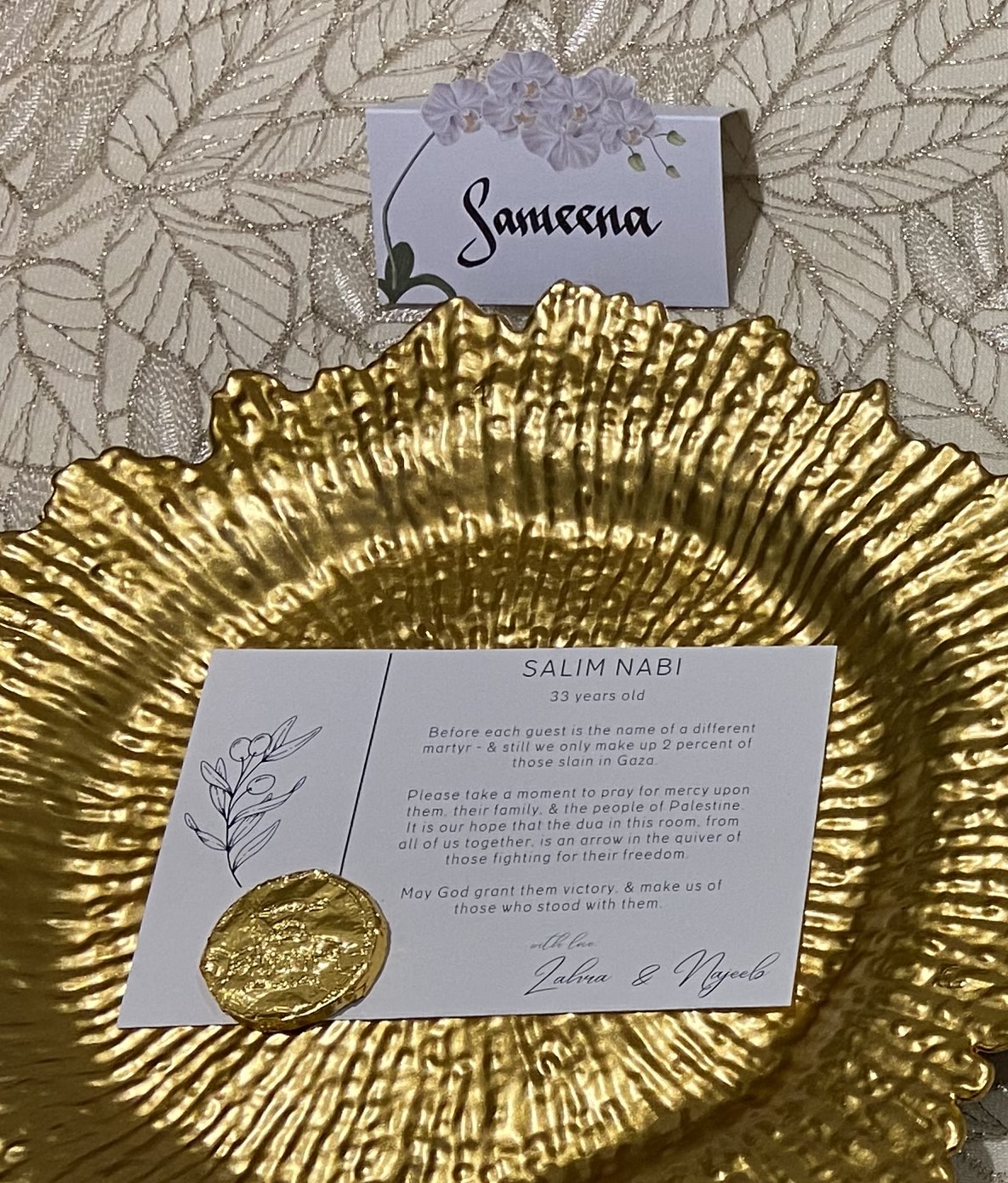
Zahra Basha, a newly minted graduate of University of Michigan, Ann Arbor, used her May wedding as a platform against the genocide in Palestine. It made perfect sense, considering she was one of 46 students arrested for protesting on campus. Every place setting at her wedding had the name and age of a martyr, and the program had a designated moment for guests to make dua for their assigned martyr. “Free Palestine” embossed wrappers adorned 650 chocolate coins. Her speech made sure that Palestine was on every single mind during the festivities.
Basha is still shocked at the police brutality she and her peers were subjected to at their school administrators’ behest. It began in response to a peaceful student sit-in on Nov. 17, 2023. “The Regents and UMich administration mobilized not only campus security and police, but also police departments in neighboring counties. They not only kept us from entering the school building, but the way the police handled the situation was inherently escalatory,” Basha recalls. “They were violently brutalizing, handcuffing, shoving students who were peacefully exercising their right to freedom of speech. Students were thrashed on the ground. It caused mass hysteria.”
Among the 200+ protesters, Basha and 45 others were arrested and criminally charged that day. A police officer yanked off her hijab. As PR director for Students Allied for Freedom and Equality (SAFE; www.facebook.com/SAFEUmich/), her role has been to record everything — and she has horrific footage of that day. What unfolded that first time has only been the beginning of extremely violent repression of its students.
The injustices against Palestinians have always struck a chord with Basha, particularly as a Muslim with Indian origins who saw the links and connections between Israel’s occupation of Palestine and India’s occupation of Kashmir. Having attended a “very Zionist high school that was always pushing a particular agenda about Palestinians and misconceptions about Muslims,” joining SAFE, once she was at college, was only natural.
When she was a sophomore, SAFE comprised seven board members. “Palestine, then, was an issue that only those in the Muslim community or those affected by it spoke up about,” she remarks. Raising awareness was SAFE’s first order of business. Though tiny in terms of scale, it held annual cultural events, a mock Apartheid Wall demonstration to display the on-going injustice, protests against the Birth-Right trip event on campus, as well as teach-ins about the history of the occupation, how Israel came into being and what the term Nakba means.
Michigan is familiar with large-scale protests and mass organizing in support of Palestine, given that Dearborn is home to a huge Palestinian population. That said, on campus “it was the same people, the same SAFE board members who were mobilizing and organizing. Few others cared to respond or show up.” As a result, the organization faced little backlash from school administrators during her first years on campus. Naturally, all that changed after October 7th. In addition, she had never anticipated the level of police brutality, how violently administrators would crack down on the student movement or how consistently they’d ignore student demands.
She believes the urgency is so much more potent today. The current board has grown to 20 members. SAFE is also at the forefront of a coalition of 69+ student organizations, mainly comprising minority student groups and those centered around civil rights. Beginning in early October 2023, the coalition issued a list of student demands asking the school to take accountability for the anti-Muslim and anti-Arab sentiments being encouraged on campus even by the administration. It also continued to call on the school to stop profiting from The Genocide in Palestine and to divest. “It’s our tuition that goes towards the school’s endowment that profits from war, and not just in Israel but across the globe. We continue to demand that the school stop funding the murder of some of our student’s family members in Palestine,” says Basha.
Even as students were being criminally prosecuted, brutalized by the police and doxed, the demand for dialogue was ignored. Even worse, the school responded with policies to repress freedom of speech. This became the spark for the encampments. “The encampments were a physical manifestation of the students’ refusal to be silenced and ignored,” Basha said. What began as a student-led effort burgeoned to include community members who’ve been willing to put their jobs and careers on the line.
On May 22, 30+ days into the encampments, the police used bulldozers and tables to plough through tents and destroy property, tear-gassed and pepper sprayed students. “Even after this next level of violence, our movement has not only grown but been strengthened by our refusal to take ‘no’ for an answer. We must remember that the repression we are facing is part of a global hegemonic system to perpetuate colonial agendas and silence minorities,” Basha concluded.
At the time of writing, the UMich administration continues to ignore demands to engage in dialogue.
Naazish YarKhan is a writing tutor and college essay coach. To learn more, visit WritersStudio.us.
Tell us what you thought by joining our Facebook community. You can also send comments and story pitches to [email protected]. Islamic Horizons does not publish unsolicited material.
The post UMich Green Lights Police Brutality on Campus appeared first on Islamic Horizons.
]]>The post Dallas Diversity appeared first on Islamic Horizons.
]]>By Rasheed Rabbi
July/Aug 2024
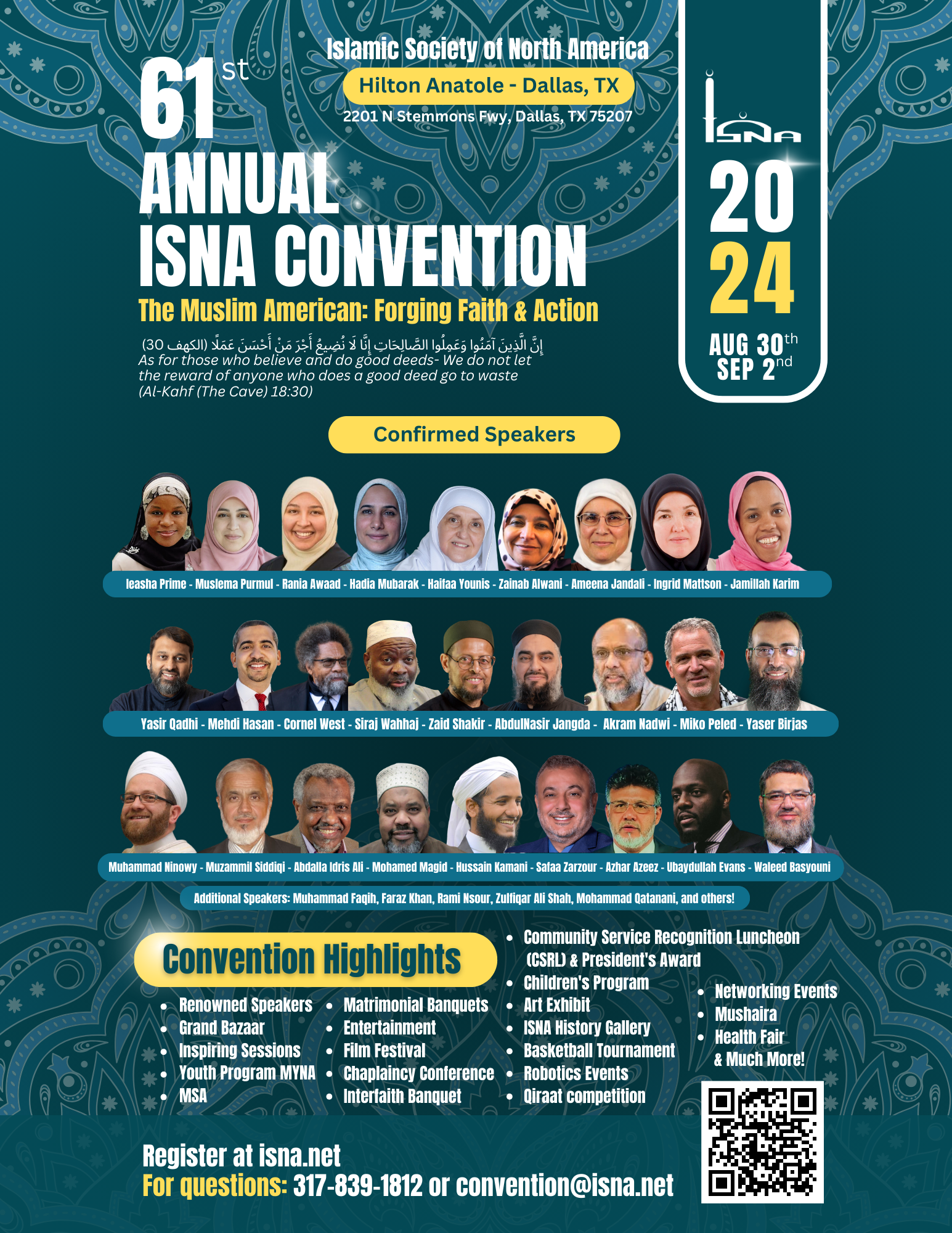
The Lone Star State is summoning Muslims far and wide to grace the Anatole Hilton, a sprawling forty-five-acre oasis north of downtown Dallas that offers a blend of fine dining, a seven-acre park, and an array of enticing shops.
Numerous nearby halal steakhouses are competing to spotlight the evolving palette of Muslim culinary delights. Rather than donning high-crowned hats, a multitude of native cowboys are proudly wearing kufis and extending a warm welcome to Muslims from all corners of North America.
Dallas, a city steeped in conservative history and a bastion of tradition, will host Muslim Americans, inviting them to partake in ISNA’s 61st Annual convention. In this city where cultural roots run deep, where the spirit of immigrants and the indigenous has thrived for centuries, the ISNA Convention stands as a beacon of inclusivity, a testament to the diversity that enriches both Texas and the entire nation.
This is no ordinary gathering; it is a celebration of growth, resilience, and the rich tapestry of distinct cultures that define Muslim life in America. It is a mosaic of voices, a symphony of stories, woven together by the threads of faith and action. For ISNA, this is not merely a convention; it is a movement of discovery, of connection, of empowerment.
Along with convening its usual vibrant panel discussions, interactive workshops, captivating demonstrations, engaging exhibitions and bustling vendor booths — all carefully curated to attract the largest Muslim audience, foster connections, ignite passions and celebrate the rich tapestry of Muslim life in the U.S. — ISNA prioritizes effectiveness and outcomes, and therefore rejects excessive formality.
As the number of Muslim attendees continues to swell, so do the expectations. This year, the overarching goal is to orchestrate a comprehensive program that nurtures our fundamental growth while harnessing religious fervor and promoting civil engagement with our non-Muslim counterparts. And to achieve this, the Convention Program Committee (CPC) has coined a theme called “The Muslim American: Forging Faith and Action.”
This year’s theme isn’t mere rhetoric; rather, it’s the crux of every session. Each session is designed to inspire action. And it’s not just about talk; it’s about tangible steps towards progress, guided by the teachings of Islam and a commitment to justice, compassion, and unity.
A dozen main sessions are designed to emphasize the dynamic relationship between faith and action. This approach encourages moderators and speakers to embody Islam’s very essence.
Session-1: Embracing Faith Holistically
To mark the height of His blessings, God has perfected our religion (5:3). Beyond its key rituals, Islam touches every aspect of life and gives each moment purpose and meaning. Embracing it holistically results in enabling us to transcend our mundane routines and enrich our lives with divine wisdom and guidance. This session focuses on transcending daily life despite being surrounded by a complex social milieu.
Session 2: Standing in Solidarity with Palestine
The ongoing situation in Palestine, especially Gaza, remains dire. It calls for solidarity more than sympathy, urging us to take concrete steps toward resolving this long standing dystopian reality. This requires a multi-faceted approach, encompassing political advocacy, humanitarian aid and grassroots activism.
Session 3: Faith Must Follow Action
Faith without action is futile, for life is merely the testimony of deeds (67:2) — and we will be rewarded by our deeds (16:97). Therefore, true faith necessitates that we extend our service to everyone who needs it, to try to have a lasting impact on the world. That awareness can be reflected in every action. This session seeks to deepen our understanding of the Quranic perspective, which strikes a balance between faith and action so that we may live a life of purpose, integrity and spiritual fulfillment.
Session 4: Fortifying Our Family: Cultivating Respect and Resilience
The seeds of resilience, cohesion and societal growth are sown within the sturdy foundation of family bonds. For Muslims, family constitutes the most profound yet subtle test, although we often take it for granted and instinctively seek solace and support within it. The Quran explains how to cultivate strong, tightly knit family units in which every member communicates and acts with a harmonious blend of empathy, even amidst disagreements (42:41-43). Translating these teachings into actionable goals for our time will foster an environment conducive to the greater good of all and move us toward a more united and thriving community.
Session 5: Threads of Unity: Strengthening Our Divine Bond within the Muslim Community
We must hold firmly to the rope of God all together (3:103). Effective communication, compassion and empathy can create an environment in which family members support one another, from local concerns to international causes. By nurturing such a unit, we can strive for a connected community to harness the growth and unity globally. Together, we can build stronger relationships, address challenges and create a harmonious environment that reflects the values of Islam.
Session 6: Inclusive Vision: Fostering Collective Empowerment for Gender and Youth
Session 9: Self-Care: Prioritizing Health and Mental Well-being
Our vision for empowerment must embrace everyone, including women and youth in addition to the men, for only this approach can ensure a comprehensive approach to progress. Including women fosters harmony, and youth engagement infuses vibrancy into the community. Inclusivity paves the way for unity, compassion, peace and a balanced worldview. This session seeks to share Quranic insights and actionable strategies as guiding principles to cultivate a shared culture of empathy and global progress.
Session 7: Dismantling Systematic Injustice and Social Prejudice
“You’re not supposed to be so blind with patriotism that you can’t face reality. Wrong is wrong, no matter who says it.” These words by Malcolm X resonate deeply with Islam’s teachings, which call upon us to stand firm and bear witness for justice, as well as to be impartial and unwavering in our commitment, regardless of the circumstances (5:8). Yet in today’s world, we confront Islamophobia, which disproportionately affects this country’s many diverse communities. As we navigate through a critical election year, the urgency for active and strategic engagement to shape leadership and policies becomes even more evident.
Session 8: Theme Session: The Muslim American: Forging Faith and Action
Forging, defined as the act of shaping something, involves moving from the undesirable to the desirable, the imperfect to the perfect and the unfinished to the finished. It describes our individual faith, which ebbs and flows and is in continuous need of being perfected. Similarly, our actions to initiate or change any situation always need improvement and go through various phases to achieve the desired results. Both faith and action need forging.
Through convention themes, we speak to all Americans. They wonder if we can approach American issues only from the lens of their own faith and offer solutions that satisfy only their own perceptions of good and bad.
We need to grapple with American issues from an all-American perspective and seek solutions that address all Americans, while continuing to advance our understanding of our faith and enhance those solutions so that they please God, the All-Merciful.
“Faith and Action” comes from a hadith that states, “Every just pact from the time of ignorance is not increased by Islam but in strength and affirmation” in reference to the Hilf al-Fudul [a pre-Islamic pact to help the oppressed in Makkah] (“Musnad Ahmad,” 2909).
In the face of adversity, Islam bestows strategies for building inner strength and coping mechanisms to empower us to navigate challenges with grace and fortitude. Drawing upon practical tips and spiritual insights, we find solace and hope in difficult times. This session provides perspectives and actionable guidance on promoting holistic wellbeing within our communities, integrating faith-based principles with contemporary approaches to health and wellness. Through education, dialogue and support, we can work together to cultivate healthier lifestyles and stronger communities guided by Islam’s wisdom and compassion.
Session 10: Muslim American Empowerment via Education
The first divine decree was to read and educate ourselves in the name of God (96:1), because education is the key to enlightened minds, fostering courage to harmonize religion and nation without conflict. It shapes our minds and hearts to embrace differences while collectively pursuing shared resolutions. Muslim Americans carry a proud legacy of Islamic institutions, seminaries and educational platforms for decades on American soil. It’s imperative to engage with and expand upon this legacy further to ensure our timely contribution to society.
Session 11: Political and Civic Engagement
While religion often begins as a personal journey, its impact extends into the public sphere, where Islam effectively engages us in political dialogue and the pursuit of a just and equitable society. The Prophet’s (salla Allahu ‘alayhi wa sallam) life serves as a model for political activism, empowering us to be agents of change and advocates for justice and a sustainable planet. From wearing masks to challenging gender stereotypes, from addressing domestic mass shootings to confronting international genocides, and from combating global warming to embracing electric cars, all issues have become inherently political, further dividing our nation. Therefore, political awareness isn’t merely an option for Muslim Americans in the U.S. – it’s an obligation.
Session 12: A Message to Take Home
Amid the bustling energy of the many speakers, sessions and a sea of enthusiastic attendees, it’s easy for the convention’s core message to become diluted. Therefore, a concluding session will ensure that ISNA’s key ideas and goals resonate deeply with everyone present. This session aims to weave together the threads of momentum that faithful Muslims need to sustain their collective movement in America. As attendees depart, they will carry with them not just cherished memories, but a renewed commitment to the values and aspirations that define and strengthen their community.
So come, be a part of something bigger than yourself. Join us as we forge faith and action, shape our communities and build a better future for all. Together, we can make a difference.
Rasheed Rabbi, a member of the Islamic Horizons board of editors, is an IT professional who earned an MA in religious studies from Hartford Seminary, is pursuing a Doctor of Ministry from Boston University. He is also the founder of eDawah (www.edawah.net); secretary of the Association of Muslim Scientists, Engineers & Technology Professionals; serves as a khateeb and Friday prayer leader at the ADAMS Center; and is a certified Muslim chaplain at iNova Fairfax, iNova Loudoun and Virginia’s Alexandria and Loudoun Adult Detention Centers.
Tell us what you thought by joining our Facebook community. You can also send comments and story pitches to [email protected]. Islamic Horizons does not publish unsolicited material.
The post Dallas Diversity appeared first on Islamic Horizons.
]]>The post Cookies Without Conscience appeared first on Islamic Horizons.
]]>By Nayab Bashir
July/Aug 2024
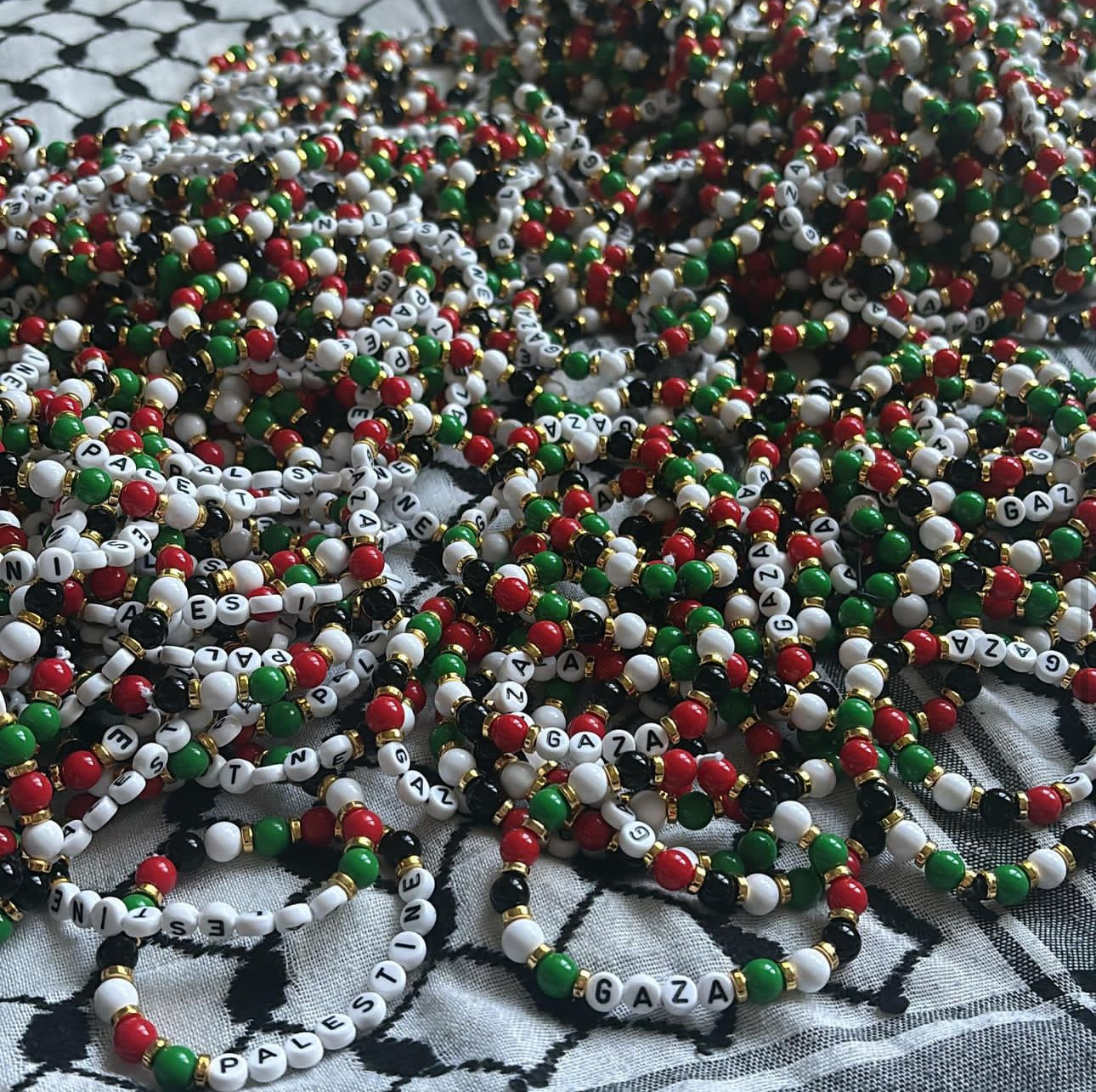
There is an American dream beyond the standard striving for upward mobility. It’s a dream of inclusion and integration, of equity. Perhaps that is what some mothers were looking for when they signed their daughters up for Girl Scouts Troop 149.
The Girl Scouts has long been a coming-of-age rite of passage. One in three women in the U.S. was a Girl Scout at some point in their life. The organization claims to build “girls of courage, confidence, and character, who make the world a better place.” Unfortunately, as of late, some disagree.
This past cookie season, Troop 149 of St. Louis, Mo., wanted to sell bracelets instead of cookies and donate the proceeds to Palestine. Not long after they announced their plans, their parent chapter, the Girl Scouts of Eastern Missouri, aggressively responded with a very clear message that the organization didn’t participate in political and partisan activities: “Girl Scouts of Eastern Missouri and Girl Scouts of the United States have no other choice than to engage our legal counsel to help remedy this situation and to protect the intellectual property and other rights of the organization” (Erum Salam, “Girl Scout troop disbands after parent chapter blocks Palestine fundraiser”, March 5, 20245, The Guardian). Not only was this surprising, but also hypocritical, as other Girl Scout troops had organized to help Ukraine after Russia’s February 2022 invasion. The Girl Scout’s website shows a troop in Ohio awarded one of the organization’s highest recognitions, the Girl Scout Bronze Award, for collecting medical supplies and packing first aid kids, friendship bracelets and cookies to be distributed in Ukraine (www.girlscouts.org/en/site-search.html?q=ukraine).
Hurt and Disappointment
Aside from the fear that accompanies a threat of legal action, the situation was hurtful and triggering for Troop 149’s founder Nawal Abuhamdeh, a Brooklyn-born Palestinian American. The stark contrast of the organization’s response to the Ohioan troop and her own stirred memories of being excluded as a child because of her identity. Both her parents were born in Beit Hanina, a West Bank village on the road connecting Ramallah to al-Quds (Jerusalem). Despite a daily yearning to return to her homeland, Abuhamdeh hasn’t visited her beloved Palestine since 2016. “Palestine is my home, my true love, and I dream of a day I can live there freely,” she states.
A freelance product designer and mother of four, Abuhamadeh has worked with various Islamic nonprofits in St. Louis. She and her husband have dedicated their lives to raising practicing Muslim children who will make a positive difference in the world. “We want to ensure that they have more opportunities as second-generation Muslim Palestinian Americans than we did as the first-generation,” Abuhamadeh said.
“This was one of the reasons behind founding the troop in 2019. My intentions were clear: ‘I wanted our girls to learn the skills they need to be strong, independent community leaders, using their Muslim identity as their superpower.’”
She believes the Girl Scouts’ mission aligned with her values of boosting “girls’ courage, confidence and character.” She feels it’s like following the Prophet’s (salla Allahu ‘alayhi wa sallam) sunnah — to use our values to make the world a better place.
Every year, the troop put in a lot of energy into cookie season, selling about $8,000 worth of them each year. They followed each rule.
But this year was different, for there are no rules and policies when it comes to advocating against a genocide. Thus, the troop decided not to participate in the annual cookie season. “We believe that in times of crisis and hardship, it is crucial to prioritize empathy, compassion and support for those who are suffering,” Abuhamadeh said. “At such a time cookies didn’t feel like the right focus. We couldn’t fathom selling cookies when our brothers and sisters are being forced to starve. We couldn’t sell cookies during a genocide.
“I am no longer going to stay quiet to make other people feel more ‘safe’ or comfortable about my identity. How could anyone see images of children and people in shreds, videos of children being amputated without anesthesia, mothers screaming for their children, children begging for their parents and not do anything about it? It is all horrific. And the worst part is that this is all man-made and our ‘leaders’ are doing nothing about it.”
While the leaders may not be doing much, when the 10-year-olds in troop saw the images, they were in tears and ready for action. They watched “Farha,” – a 2021 internationally co-produced historical drama film about a Palestinian girl’s coming-of-age experience during the Nakba (https://en.wikipedia.org/wiki/Farha_(film)), at a group movie night and followed it with a restorative circle with a mental health specialist where each girl cried and expressed their feelings about what is happening in Palestine. They said they felt guilty for being happy when kids in Gaza are being killed, displaced and injured.
The girls, of Pakistani, Jordanian, Somali and Palestinian heritage, didn’t feel they could be happy selling cookies. They asked if they could sell bracelets instead to raise funds for Gaza. Adults agreed and quickly set their idea in motion.
Girl Scouts Disapproves
It is uncertain how exactly The Girl Scouts of USA found out about the troop’s plans. It was never a secret, as at the time the foundation’s reaction was unexpected.
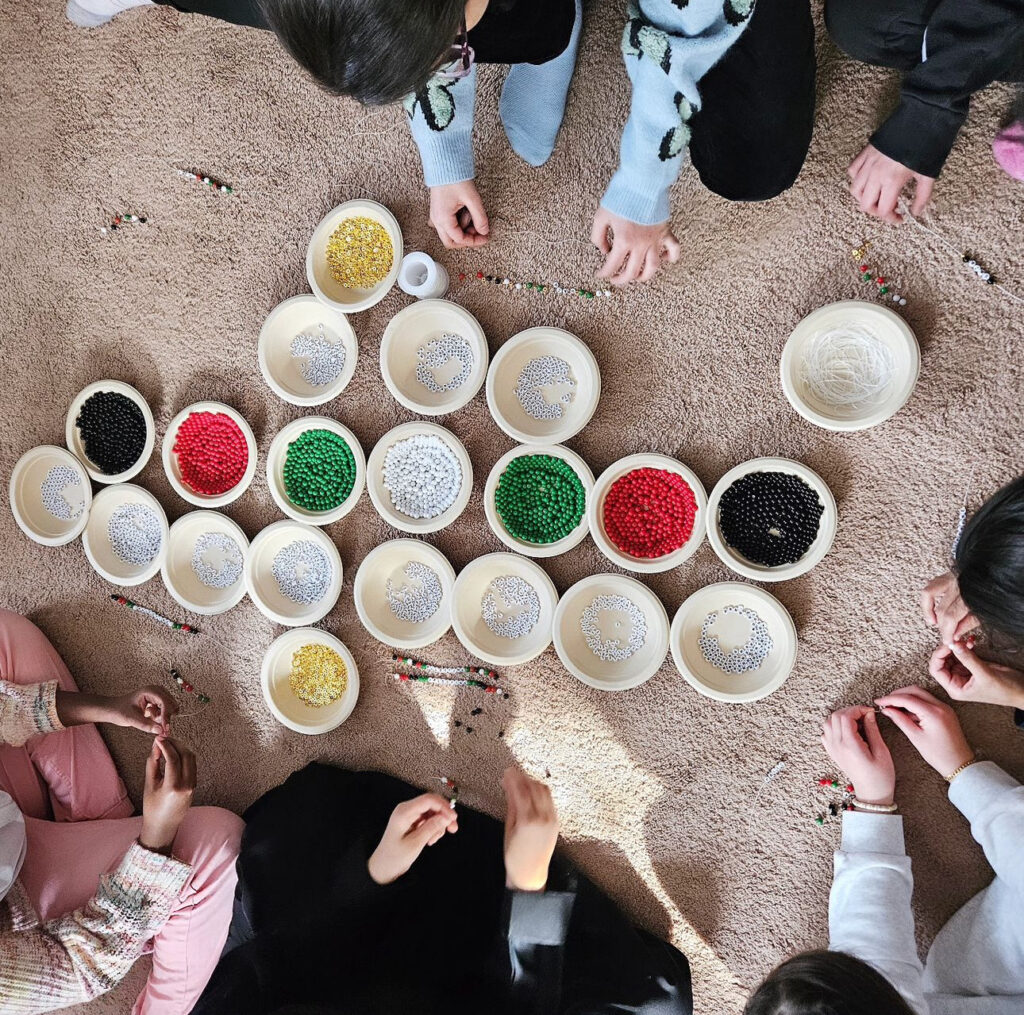
Before Abuhamadeh could respond to the first email, she had three more in her inbox. She was afraid they may take legal action against her. The message was clear. The email called for immediate removal of all communication, social media posts and reference to the organization in the troop’s efforts, stating clearly that this was not an approved activity. Upset, confused and worried, Abuhamadeh contacted CAIR-Missouri and was asked to “keep them in the loop.”
“I independently responded to them, expressing that this is not political or partisan and how dire the humanitarian crisis is in Gaza.” More than anything, she was disappointed. She exchanged a few emails and texts with CAIR but was told that “they didn’t notice a discrimination case.” Some feel the matter is resolved; however, Abuhamadeh and her troop do not agree.
The troop disbanded because it felt that The Girl Scouts don’t practice what they preach. Prior to this situation, everything their troop had participated in embodied the organization’s values. Abuhamadeh ensured that the meetings and activities were girl-led, that members left each meeting better than they’d come, were honest and fair with each other and the people they were around and made their communities better through their service.
The Girl Scouts no longer holds any appeal for the former troop. “After their long silence, we aren’t expecting them to apologize. We’ve come to accept that, and [it] further makes us feel that we made the right decision to leave Girl Scouts. Their organization isn’t a good fit for us, who we are and the causes we stand for. If you aren’t pro-peace and anti-genocide, we don’t want to be associated with you. We’d prefer to stay on the right side of history.”
After CAIR contacted Girl Scouts, their chief executive, Bonnie Barcykowski wrote that they “were disappointed and disheartened by what recently transpired” and they “recognize the greater clarity and additional education is needed regarding fundraising policies.” Further adding “this is a learning moment for our organization as we realize we can always do better. We know we should always lead with empathy and recognize the incredible need for kindness and compassion during this difficult time, we are also deeply committed to advancing belonging, inclusion, and anti-racism as an organization and within our membership, and we will continue to ensure that we address all communities, including the Muslim and Arab communities. GSUSA will be working alongside our council partners to review this incident and make the necessary adjustments to prevent it from happening in the future. We realize we missed an opportunity to champion our troops while they make a difference.”
Bracelets Bring Big Bucks
The resilient group of girls has moved onward and upward. On their first order form they sold 600 bracelets in two weeks. Once the story hit social media, they sold 2,106 bracelets in less than four days and had to close orders again. They called out to volunteers and were humbled by the response as people from all over southeastern Missouri and southern Illinois joined them to help complete and dispatch orders.
As of early May, the troop has raised over $20,000 for Palestine Children’s Relief Fund.
Abuhamadeh accepted every interview request from all media sources, including STLPR, NBC, Washington Post, The Guardian and more, but refused to interview with FOX for their biased and racist coverage of Gaza. “I wasn’t going to give them an opportunity to slice my interview into being the story that they want to tell, putting me in jeopardy of portraying me in a negative light.”
Her daughter Mariyah Abdelbaset,11 joined her for an interview with NPR. It was an emotional moment for both. “It was my first interview with my daughter, and I was proud of her for using her voice. I was sad to hear her talk about how she doesn’t feel like she could be happy when the kids of Gaza are not. I was thankful that I was given the opportunity to tell our story, amplify the voice of Palestinians and could inspire others to stand up for what is right in the world. It is only when we are united that we can make an impact in the world.”
Unsure of what the future holds, Abuhamadeh and the girls are choosing to focus on the positive and hope to enter the new chapter with excitement and motivation to make a positive difference in the world.
Nayab Bashir is a literature aficionado with an English literature degree to prove it.
Tell us what you thought by joining our Facebook community. You can also send comments and story pitches to [email protected]. Islamic Horizons does not publish unsolicited material.
The post Cookies Without Conscience appeared first on Islamic Horizons.
]]>The post Palestinians Demonstrating Resilience appeared first on Islamic Horizons.
]]>By Naazish YarKhan
July/Aug 2024
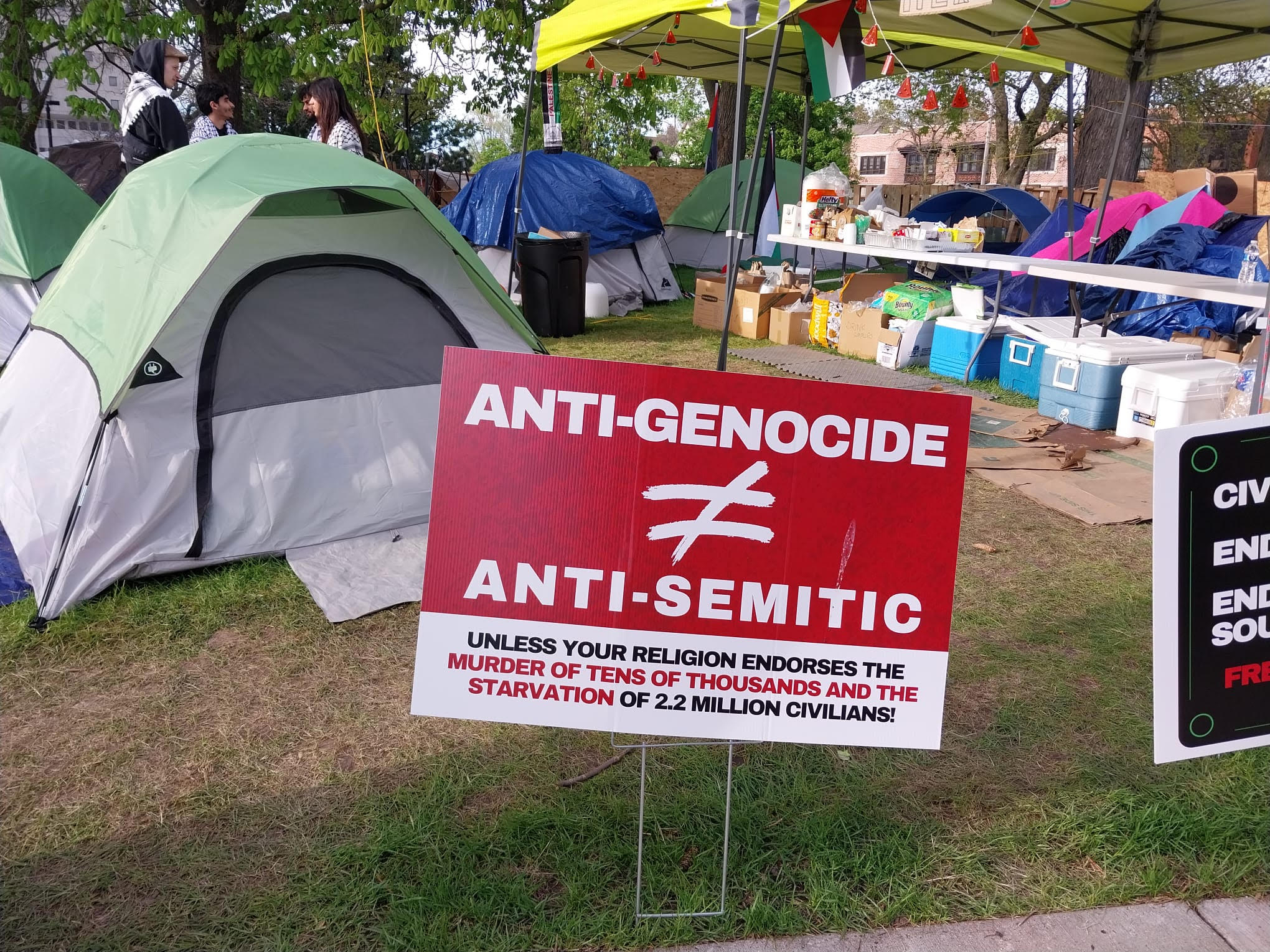
A generation once written off as soft and self-absorbed, as kids raised on filters, selfies and trigger warnings, is showing the world what they are truly made of. Shorouk Akarah, a senior at DePaul University, joined the pro-Palestine, pro-ceasefire efforts through the DePaul Divest Coalition, a group of organizations that want to make sure that DePaul is on the right side of history. She also worked on efforts to get Chicago to pass the resolution in favor of a ceasefire.
“In a sense, Chicago passing a resolution gave us a leg up to do more things. I had never imagined it would get to encampments,” Shorouk said. “That students would have to camp out for days and weeks on end for schools to acknowledge that this was happening. We don’t know exactly where our tuition dollars are going, and students across campuses want to know. Our tuition dollars are killing our family members in Gaza. No matter whether you have a relative in Gaza or not, we are all Palestinian.”
Her role in the DePaul encampment is to manage the supply, medic and food tents, and collect donations, to ensure that those staying at the encampments overnight have all they need. “Us students are the next generation. We are the ones that are going to see this through, insha Allah,” Shorouk said. “No matter how old or young you are, it is very important [to be involved] not just as Palestinians, but as people in general. It is about time.” Awareness and education are critical to keep the momentum going, she emphasizes.
She agrees that this all started way before Oct. 7, 2023. The siege on Gaza is heading into 17 years. The occupation has [lasted for] over 76 years. “Why do people continue to let it happen? Knowing all this is very important, because it keeps you going,” she said. She believes that calling for divestments, besides the economic ramifications, is also a call for schools to recognize what is happening right now.
Police Brutality
However, the police brutality that ensued in response to the encampments across some campuses did not surprise her.
“We’ve always been taught that the police look at us as ‘the other,’ the aggressors, when it is the opposite. Police escalate things or do nothing to protect the students in encampments,” she relates. “That is why we always say at the DePaul encampments, ‘We protect ourselves; we protect each other. We don’t need outside security.’ We check in with fellow students. We have trained marshals who know what to do if the cops show up. We also have lawyers on hand, just in case.”
These youth believe that the Palestinians are showing them what resilience looks like. They feel the encampments are not just important for them, but also to other minority groups who’ve come together to create this coalition. “The encampments and protests show that Palestinian voices have been heard and are being lifted by us,” Shorouk said.
“We can do more here to help them there. My university is trying to give us ‘our space’ but, sooner or later, we expect them to come and say, “Enough is enough.” But we are not going to back down. Our school is openly Zionist, and our end goal is to get DePaul to divest. One thing we are doing well is to ask our administration to send people who can help us with our negotiations, people in positions who can help us.”
All this is not to say she wasn’t afraid. She is pursuing law and wants to work for the state. She is, to an extent, afraid because she has had people come to the campus and take photos. We emphasize safety and [ask students to] put masks on. Someone I know is on the Canary Mission website. He told me, “Being on that website is a badge of honor.” I’ve started to say that a lot myself.
As we witness the second Nakba unfold, Shorouk and those around her hope that their efforts and the efforts of all those around them will, God willing, destroy the status quo when it comes to Palestine.
Naazish YarKhan is a writing tutor and college essay coach. To learn more, visit WritersStudio.us.
Tell us what you thought by joining our Facebook community. You can also send comments and story pitches to [email protected]. Islamic Horizons does not publish unsolicited material.
The post Palestinians Demonstrating Resilience appeared first on Islamic Horizons.
]]>The post 600 Youth Participate in MYNA “Qiyamps” appeared first on Islamic Horizons.
]]>By MYNA Staff
July/Aug 2024

In the realm of Muslim youth empowerment, MYNA (The Muslim Youth of North America) has long been revered for its commitment to nurturing the next generation of leaders grounded in Islamic values. During Ramadan, MYNA embarked on an unprecedented journey by organizing its first-ever Qiyamps, 24-hour spiritual retreats designed to deepen participants’ connection with their faith and foster personal growth. This groundbreaking initiative, which took place across 15 different mosques across the country, brought together over 600 attendees nationwide for a transformative journey of enlightenment, empowerment, and unity within the Muslim youth community.
At the core of MYNA’s Qiyamps was the theme “Iqra: The Revelation of the Quran,” which was inspired by the command of the first revelation of the Qur’an to the Prophet Muhammad (salla Allahu ‘alayhi wa sallam). Participants were invited to embark on a journey of enlightenment and discovery, delving deep into the timeless wisdom and guidance contained within the pages of the Quran. Through heartfelt lectures, interactive workshops, and reflective sessions, attendees explored the beauty, relevance, and transformative power of the Quranic message in their lives.
“We read a lot of Quran during Ramadan but sometimes don’t take the time to truly understand it, and this event was an opportunity to take a closer look at what Allah (Subhanau wa Ta’la) revealed as the guide in our lives,” Sarah F. said. “It was nice to hear from our teachers and scholars how to connect with the Quran in the blessed month in which it was revealed.”
“MYNA’s Qiyamps also offered a diverse array of programming designed to cater to the spiritual, intellectual, and social needs of participants,” said Alaa Abdeldaiem, MYNA Manager. “From engaging workshops on topics ranging from personal development to social justice to Islamic Jeopardy sessions that put participants’ knowledge to the test, there was something for everyone.” Gender-separate sessions provided a safe and inclusive space for deeper discussions and reflections.

Qiyamps included tafseer sessions after taraweeh and youth-led tahajjud prayers. Quran circles provided a space for contemplation, and communal recitation of the Quran,
“The MYNA Qiyamp at NWIIC (Northwest Indiana Islamic Center) was a wonderful experience, combining spirituality with fun in a way that resonated with everyone involved,” Farah H. said. “The youth had a fantastic time engaging in various activities, and I found the experience deeply enriching as well. The sense of community and shared purpose was truly inspiring.”
“The Qiyamp at my masjid was just a taste of what MYNA has to offer year-round,” Saleh A. said. “I’m excited to build off of this experience and stay involved with the amazing work MYNA does and continuing to grow closer to Allah along the way.”
During Ramadan, MYNA also hosted its annual Quranathon, an event where youth sign up to read and connect with the holy Quran. “48 participants came together and collectively read 4690 pages of the holy Quran this year Mashallah!,” said Amal Sarhan, MYNA Communications Coordinator. “Their dedication and commitment to this spiritual practice was evident as they immersed themselves in the verses, fostering a sense of unity and reverence within our MYNA community.” Participants were rewarded with prizes, adding an element of excitement and encouragement to their journey of Quranic exploration.
Coming Up!
ISNA’s Youth Development Department is also gearing up for six summer camps revolving around the theme of “Adab in Action”. Rooted in Islamic tradition, adab embodies the refined behavior, etiquette, and virtues exemplified by the Prophet. Campers will explore how his legacy serves as a beacon of guidance, illuminating the path towards embodying Adab in thought, speech, and action. Through practical workshops and role modeling, campers will empower themselves to become agents of positive change within their communities, inspiring others through exemplary conduct and ethical leadership, and leaving a legacy of excellence.
The Mid-Atlantic all girls camp will be an enriching experience designed to foster spiritual growth, personal development, and sisterhood in a supportive Islamic environment. Led by knowledgeable mentors and counselors who share a deep commitment to Islamic values, the programs are designed to inspire girls to connect with their faith, and strengthen their character. Topics like body image, women’s role in Islam, mental health, nutrition, and more will also be explored. Whether it’s learning about Islamic history, exploring the natural world, or simply sharing laughter and stories around the campfire, our all girls camp offers an empowering and unforgettable experience that leaves a lasting impact on the hearts and minds of our campers.
Find out dates and locations at myna.org/camps
Tell us what you thought by joining our Facebook community. You can also send comments and story pitches to [email protected]. Islamic Horizons does not publish unsolicited material.
The post 600 Youth Participate in MYNA “Qiyamps” appeared first on Islamic Horizons.
]]>The post Will Plant-based Meat Replace Real Meat? appeared first on Islamic Horizons.
]]>By Mohammad Abdullah
July/Aug 2024

A Feb. 5 Washington Post headline proclaimed, “Your plant-based meat could soon have animal fat because the taste experience is not at par with real meat.” The story looked at this relatively new type of meat created from plant ingredients. This procedure is considered more humane and environmentally sustainable than livestock farming and slaughtering. However, the number of U.S. consumers eating it hasn’t changed over the past 20 years and has remained relatively stable as less than 10 percent.
The University of Edinburgh (Aug. 25, 2023) research suggests that despite sustained growth for several years, plant-based meat products sales are now stagnating. People wonder if such meat alternatives will ever replace the real thing.
Real Meat, Plant-based Meat Alternatives and Climate Change
Food analysts find no signs of plant-based meat alternatives entirely replacing conventional meat because consumers are making choices based on cost and flavor. Presently, the most-commonly used fat in plant-based meats is coconut oil, which doesn’t give the flavor that animal fat does. Some companies now cultivate blocks of pork belly fat in the laboratory and even add such meat byproducts as fat trimmings, collagen and broth components to plant-based bacon, meatballs and sausages.
Scientists, well-aware of the importance of sustainability, want to see some meat alternatives, because animal-based agriculture is a big part of the advanced stages of the world’s largest-ever environmental catastrophe. According to the Intergovernmental Panel on Climate Change and FAO, a fully developed cow can emit up to 500 liters of methane each day. In addition, raising livestock for human consumption generates nearly 15% of total global greenhouse gas emissions — greater than all transport emissions combined. And cows produce more methane gas than all other ruminants combined. (“Global Warming and Dairy Cattle,” www.ncbi.nlm.nih.gov>pmc).
After agriculture, fossil fuels are the largest source of methane emissions. More than 150 nations have joined the Global Methane Pledge and vowed to cut releases of greenhouse gas by 30% by the end of this decade from 2020 levels (Bloomberg News, March 25).
It may seem like we’re undergoing a massive transformation. However, “first-generation” meat alternatives like tofu — first recorded in China about 2,000 years ago — and tempeh — first documented in the 1600s in a Central Java village, are well known. These protein-rich foods bear little resemblance to meat. “Second-generation” plant-based meats, however, like Beyond Meat and the Impossible Burger, are designed to look, cook and taste exactly like meat.
Michigan State University’s Department of Biosystems and Agricultural Engineering explains the plant-based meat lifecycle: Extract proteins from raw materials, (https://seas.umich.edu/) and use heat through an extrusion-process to structure/texturize the proteins. To give consumers that taste and color of blood, Impossible Burgers use a protein called heme, drawn from the root nodules of soybeans. The soybean DNA is extracted and inserted into a genetically engineered yeast, which is fermented to produce heme, and then mixed in with the other ingredients. When it is cooked, an Impossible Burger releases its heme. Beyond Meat, on the other hand, uses beet juice for that characteristic red color associated with meat. The two burgers are almost identical when it comes to nutrition.
Corn and soy are often key ingredients in plant-based meat alternative products, and more than 92% of U.S. corn and soy is genetically modified (https://ers.usda.gov>recent-trends).
In case you haven’t noticed, as of Jan. 1, 2022, “GMO” labels on grocery store food and beverage products require the phrase “bioengineered” or “derived from bioengineering.” But new rules exempt foods sold by restaurants, food trucks, delicatessens or served by airlines (“Read the Labels Carefully Before You Eat,” https://issuu.com/isnacreative, May/June 2023).
A 2018 University of Michigan study by Martin Heller (core staff, research specialist, Center for Sustainable Systems) compared the Beyond Burger to a quarter pound of beef and found that “Beyond Burger generates 90% less greenhouse gas emissions, requires 46% less energy, and has 99% less impact on water scarcity and 93% less impact on land use.” Similarly, the Impossible Burger’s carbon footprint is 89 % smaller than a beef burger and uses 87% less water and 96% less land (https://css.umich.edu).
Unresolved Issues
According to a report in the foodnavigator-usa.com (Feb. 17, 2023), 63% of U.S. consumers began eating plant-based products because they are perceived as healthier, while 40% started eating plant-based products because they felt doing so is better for the planet.
But the existing meat substitutes aren’t as affordable as real meat, not similar enough in taste and haven’t been proven to be healthier. So, many consumers cannot justify spending money on these products to help the planet (“The Big Bet on Meat Alternatives Fails,” Newsweek, June 11, 2023).
Interestingly, while the Stockholm Environment Institute has reported producing animal-based food accounts for as much as 20% of total greenhouse gas emissions, a key driver of biodiversity loss, the world’s appetite for real meat has more than doubled since 1990. Reaching 339+ million metric tons in 2021, the U.N. Food and Agriculture Organization (FAO) predicts that it will rise to 374 million metric tons by 2030. (“Alt-meat fever has cooled,” Washington Post, Nov. 12, 2022).
The taste might not be the same as traditional meat, and it cannot be synthesized naturally by the body. A comparative assessment study of both meat products’ nutrition profile found that “When compared to meat burgers, plant-based burgers had an unpleasant taste, less juicy, dry, and grainy. In fact, texture attributes, such as fibrous structure, tenderness, and juiciness of meat protein, are very difficult to recreate in plant-based analogues according to this study” (https://www.ncbi.nlm.nih.gov>pmc).
And the May 12, 2023, Washington Post opinion piece “Where is the Beef?” stated that the taste, texture and smell of fake meat are unappetizing; too expensive; the ingredient lists are too long; and it isn’t well suited to American culture. Companies should stop playing imitation games. Properly prepared vegetables are likely to taste better than vegetables pretending to be ground beef. In the meantime, invest in ways to make real meat production more efficient and ethical, as well as less environmentally destructive.
While arguments can be made on both sides, plant-based meat products offer some nutritional benefits such as low saturated fats and cholesterol, in which animal proteins are known to be high. They also offer a more sustainable approach with reduced land and water, lower emissions and can help address the problem of protein for individuals with limited access to animal-based proteins. A 2013 analysis from the University of Minnesota found that if existing cropland was used to feed people directly, 4 billion more people would be fed (Science Daily).
Although beef alternatives might be better for the environment, they might not necessarily be better for your health. David Katz (founding director, Yale University’s Prevention Research Center) says that “plant-based meat products like Beyond Meat are not nutritional alternatives to real plant foods, like beans or lentils, which provide enough nutritional value on their own. The problem is that the marketing surrounding these meat alternatives has been pitched exactly that way.” And according to a July 3, 2019, Harvard Gazette article, the health effects of these products need to be monitored, because, “plant-based” does not necessarily mean “healthier” (https://www.hsph.harvard,edu>news).
The promise of “alt protein” was to create healthier alternatives so indistinguishably delicious from the real thing that they would eventually overtake the entire industry. Although this goal is worthy, it has yet to become a reality (Fast Company, May 22, 2023).
One driving force behind plant-based meat is the increasing awareness of traditional animal agriculture’s environmental impact. The growing business of food technology is also revolutionizing the way we eat. Some industry experts consider cellular agriculture the wave of the future, and a growing number of companies are focused on developing lab-grown meat.
A Kansas City Star headline in November 2023 proclaimed “Meat made from cells (lab-grown), not slaughtered livestock, is here. But will it ever replace traditional meat?” My response, “Lab-grown meat is closer every day,” published in their print and online editions in March 2024, was that it depends, among other things, largely on their prices and consumers liking it as much as they like traditional meat. Even then, a segment of society might reject it or be highly processed or potentially have an even larger carbon footprint.
Marketing leads us to believe that plant-based burgers consist solely of plant ingredients. However, these heavily processed foods contain preservatives, additives, fillers, texturizers and chemicals linked to cancer, and are high in sodium and low in nutritional quality. On May 12, 2022, The Wall Street Journal and New York Post ran full page ads against these products and asked readers to see what they are really eating (www.cleanfoodfacts.com/ingredient-guide/).
According to David Lovell (environmental scientist, Stanford) both types of meat are unlikely to offset livestock agriculture’s climate and land use impacts anytime soon. In the meantime, policymakers would do well to focus on ways to dramatically reduce emissions of animal-based systems (www.news.stanford.edu).
How You Can Help
When will policymakers come up with ways and means to dramatically reduce the emissions of animal-based systems? People can help by reducing food waste and meat consumption, among other things. If everyone skips a hamburger, it saves us 660 gallons of water, 64.5 square feet of land, 13 pounds of feed and 5 kilograms of CO2 according to Vegetarians vs Vegan vs Flexitarian Diet – Everything you need to know (www.naturesfynd.com/blog).
Instead of completely eradicating meat from our diet, we should leave behind a carbon footprint, a measure of our impact on the environment. Reducing meat consumption and mitigating food waste will help considerably slow the current unsustainable cycle of livestock supply and demand, especially in the face of climate change.
Mohammad Abdullah, DVM, MS (Agri. Tech.), MPH, who retired after serving 29 years with the U.S. Department of Agriculture’s Food Safety and Inspection Service — the agency that regulates the meat industry — is the author of “A Closer Look at Halal Meat from Farm to Fork” (2016).
Tell us what you thought by joining our Facebook community. You can also send comments and story pitches to [email protected]. Islamic Horizons does not publish unsolicited material.
The post Will Plant-based Meat Replace Real Meat? appeared first on Islamic Horizons.
]]>The post Raising Special Needs Kids appeared first on Islamic Horizons.
]]>By Sadia Waheed
July/Aug 2024
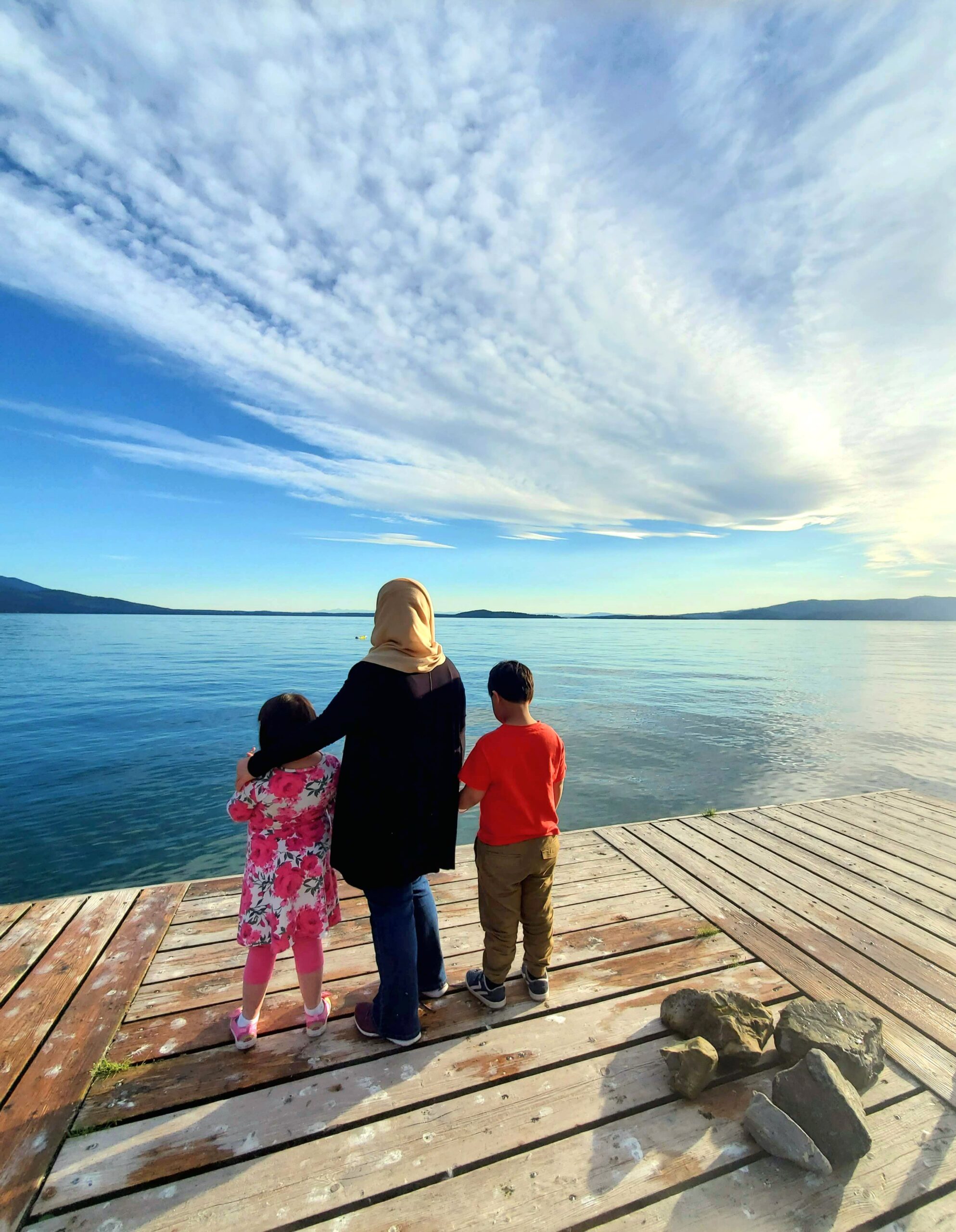
Twelve years ago, a few hours after my son’s birth, his pediatrician walked in and uttered the words I had never imagined hearing. Hearing the diagnosis of Down syndrome, and a long list of things he may never be able to do, was the hardest moment of my life as a mother.
Having to go through this experience twice had a very strong impact upon my mental health. When my daughter was born with the same diagnosis, I knew I wasn’t ready emotionally. However, I wanted to welcome her with a heart full of gratitude, a heart that valued every life no matter how it conformed to society’s standards.
Both children spent several weeks in the neonatal intensive care unit (NICU) healing their bodies while I had to come home to an empty crib every night. The first few years of their lives were filled with countless appointments, therapies and surgeries. There were many moments when I couldn’t keep up with their unique challenges. It took years of hard work and sacrifice to get to where we are today. Not a moment goes by without feeling grateful for all the blessings that came our way during this journey. We all plan and picture our life a certain way, but we forget that God is the best of all planners.
Your child’s diagnosis represents a major shift in the expectations you may have had for them. An unending roller coaster ride of questions about their quality of life and the “what ifs” clouded my thought process. It took every ounce of patience in me to accept a life for which I wasn’t prepared.
Down syndrome targets every aspect of a child’s development, for it affects every cell in his/her body. It challenges physical and intellectual development. As a mother, I wished to hide my children’s distinct physical features, which made their diagnosis obvious. I wanted everyone to see them without the labels attached, to give them a chance before making assumptions. With time, I realized that Down syndrome doesn’t define them, that it’s just a small part of them. There is a special spark in their nature that attracts kindness and love wherever they go.
Move to Montana
My husband and I had to make many life-altering decisions for our children’s benefit by stepping into an unknown world, for they rely heavily on various therapy services to succeed in life. Once Covid started in 2020, all therapy services were halted, and our children started regressing. There was no end in sight for months. After searching for improved support and better opportunities, we packed a few bags and moved from Texas to Whitefish, Mont. — a small town we had never heard of but reputed to have good special education services. When one door closes, another opens with God’s endless mercy. Four years later, it became apparent to us that this was the best decision because it has benefited our children immensely.
The years our children spend in an inclusive public-school setting are the main years of their lives, a time when they can learn and make friends. Nothing is guaranteed after school ends, for they might be unable to go to college or hold jobs. Therefore, the thought of giving them the best school years keeps me searching for better options. Migrating for our children’s wellbeing and relying only on God’s help to secure a future for them ended up being the best decision for them.
Despite the many challenges that come with parenting two children with disabilities, our family life is filled with many memorable moments of love and joy. Our children continue to make us proud with their hard work and resilience. They compete in Special Olympics skiing, bowling, and track and field competitions. All these sports require them to work twice as hard as their peers. They spend months on acquiring some simple life skills that many others take for granted. They have taught us to slow down and enjoy life’s little blessings.
Every passing year is a realization of life’s limited possibilities for them as adults. I have often felt terrified of what their future might be in this ableist world that struggles to value the contributions of the disabled.
Societal Stigma
As a mother of two children with Down syndrome, I was introduced to a world where disability is viewed through a lens of stigma and shame. My children are a reminder from my Creator of His perfection and decree. Down syndrome is a chromosomal disorder that can happen to anybody, for it occurs randomly. Despite being non-hereditary, it’s often blamed on the parents.
Sadly, many Muslims equate disability with divine punishment or lack of faith, and thus share an underlying assumption that our children are burdens or a reflection of our failures. Parents often find themselves grappling not only with the practical challenges of raising their disabled child, but also with the emotional toll of societal judgment. This stigma leads many to live isolated lives to shield their child from unwanted stares and comments.
The fear of the unknown and the uncertainty of life that comes with a diagnosis also goes hand in hand with the joy and excitement of raising our uniquely talented children. As we are welcomed into an unfamiliar territory with limited possibilities, we become our children’s relentless advocates, protectors and champions. In the years since their births, our family has experienced the true happiness of living in the moment while cherishing all of life’s blessings. Both our children have beautiful personalities that impact all those around them positively, bring smiles to their faces and warmth to people’s hearts. Our children have taught us the meaning of unconditional love, acceptance, patience, mindfulness and gratitude for everything in life.
Finding Purpose
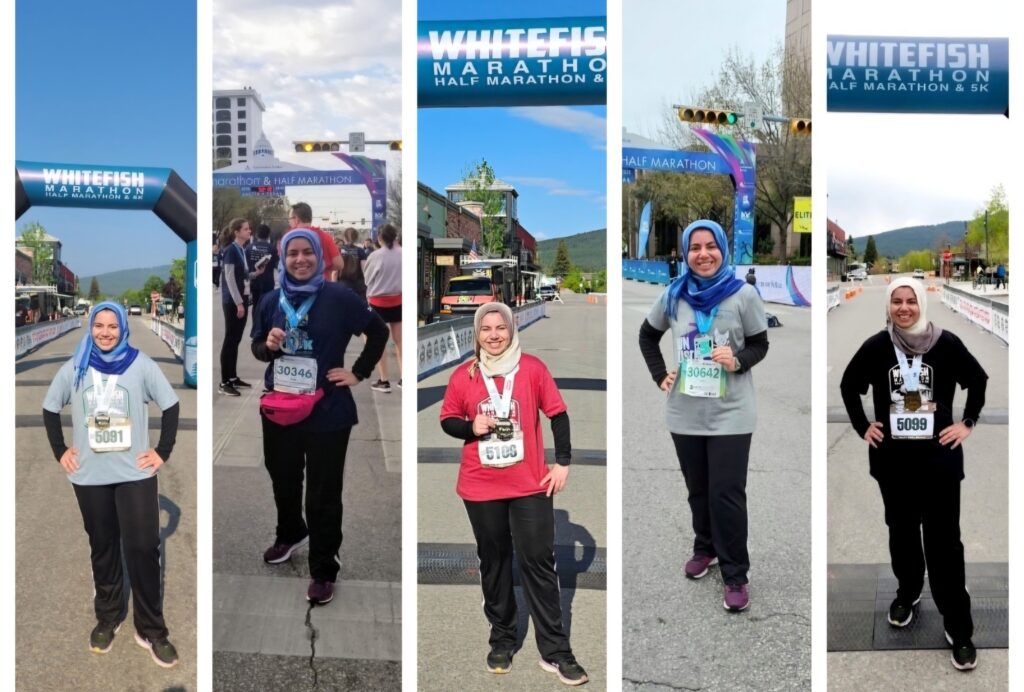
The challenges my children face while navigating a world that isn’t designed for the disabled has opened my eyes to the broader needs of the disability community. My children are an inspiration behind an important mission that I started after realizing the need for empowering the underprivileged disability community in Pakistan. We started the US Chapter for Rising Sun Institute in Pakistan, which provides resources and therapy services to the disabled.
As a lifelong caregiver to two with disabilities, it’s my goal to be physically active and dedicate time to fitness and overall wellbeing. For the last 8 years, I have run to fundraise for the disability community. Running has become a meaningful tradition for me to channel my love and advocacy into something tangible. Every step honors my children’s resilience and symbolizes the strides we need to make towards a more inclusive society.
I’ve often felt heartbroken at the thought of what our future might look like as I age, and my kids get older. But I’ve learned and realized that there is nothing I can do this in this regard. I can only provide them with opportunities and do my best to equip them with the skills they need to succeed. I leave the rest to God. The Creator, the artist and author of their lives, has written what’s best for them. We love our children unconditionally, but also struggle with the reality of a life we never imagined.
My children have redefined motherhood for me. I’m no longer the grieving mother. The stares and whispers, along with the discomfort of our judgmental society, doesn’t bother me anymore. I’m proud of how far my children have come. Worries about their future often keep me awake, but I also know that their Creator loves them more.
Do’s and Don’ts When Interacting With Special Needs Families
• Early in the diagnosis, allow parents to acknowledge and honor their feelings without judgment. It’s only human to grieve the loss of your expectations.
• Never ask why their child has special needs.
• Don’t offer unsolicited advice and homemade concoctions to “fix” the issue.
• Create a more inclusive environment for individuals with disabilities to help them feel welcomed and valued. Remember to invite special needs children to your birthday parties and events.
• Rally for your mosque to have ramps, disabled parking and accessible bathrooms, along with recreational facilities in the community.
• Educate the congregation about disabilities in Friday sermons. Have a special needs child present an award or recite a surah at your next fundraiser.
• Children learn by example, so modeling the right behavior without staring or whispering about a person’s disability is important.
• Emphasize similarities rather than differences and make sure to use the right language. Have a zero-tolerance policy for using derogatory or offensive terms.
• Set up a meal train when a family is going through a difficult diagnosis or treatment.
• Employ special needs youth and adults in local businesses wherever possible. Help direct other families toward internships or volunteering opportunities.
Sadia Waheed, a disability advocate and a biotech professional, is dedicated to breaking down barriers, challenging stereotypes and creating a more equitable and inclusive future for all.
Tell us what you thought by joining our Facebook community. You can also send comments and story pitches to [email protected]. Islamic Horizons does not publish unsolicited material.
The post Raising Special Needs Kids appeared first on Islamic Horizons.
]]>